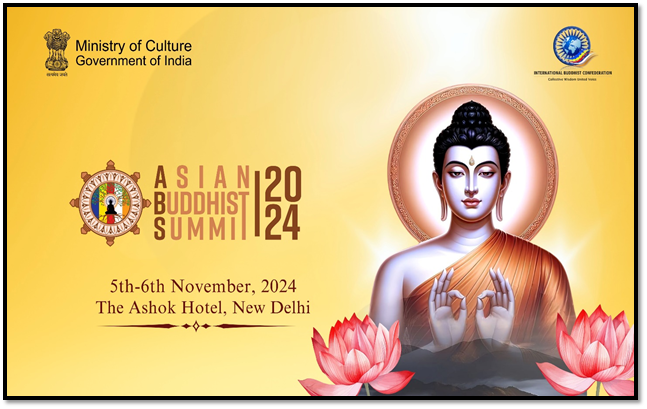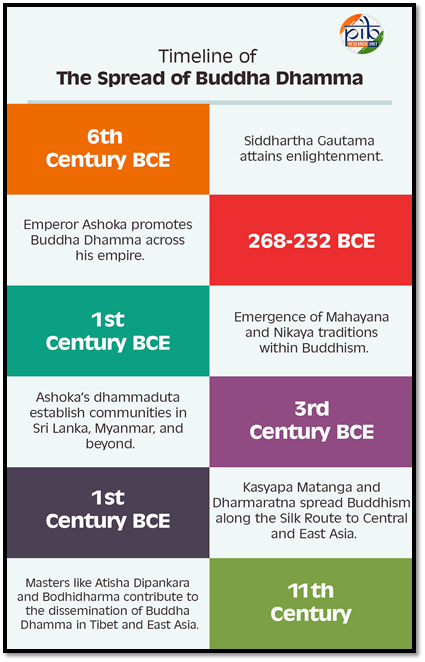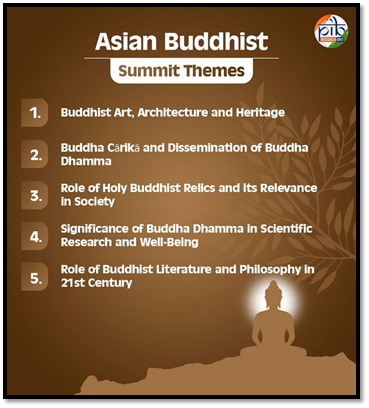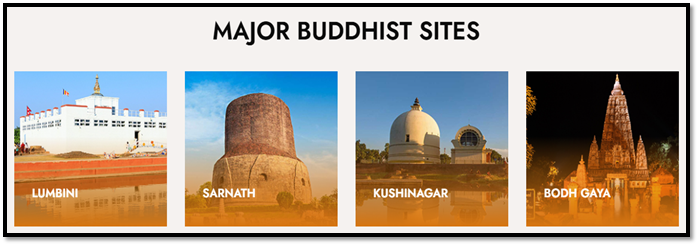Ministry of Culture
Asian Buddhist Summit 2024
Posted On:
04 NOV 2024 5:47PM by PIB Delhi
Introduction

India, a vibrant tapestry of diverse cultures and religious beliefs, has long been a heartland of Buddhism. This ancient tradition not only flourished within its borders but also spread to various countries. To celebrate this rich heritage, the Ministry of Culture, Government of India, in collaboration with the International Buddhist Confederation (IBC), is hosting the First Asian Buddhist Summit (ABS) on November 5-6, 2024, in New Delhi. The summit, themed "Role of Buddha Dhamma in Strengthening Asia," will feature esteemed Sangha leaders, scholars, and practitioners from across the continent, fostering dialogue and understanding while addressing contemporary challenges faced by the Buddhist community. The Hon’ble President of India will attend as the Chief Guest.
Background

The journey of Buddha Dhamma began in the 6th century BCE when Siddhartha Gautama attained enlightenment and began sharing his profound insights. Following the Buddha's Mahaparinirvana, his teachings were preserved and disseminated by his followers, leading to the emergence of the three major Buddhist traditions: Theravada, Mahayana, and Vajrayana.
The Mauryan Emperor Ashoka (268-232 BCE) played a crucial role in propagating Buddha Dhamma, demonstrating how its teachings could transform society by fostering peace, happiness, and harmony. His governance was rooted in Dhamma principles, and his rock and pillar edicts stand as enduring symbols of the widespread dissemination of Buddhism across Asia.
As Buddhism grew, various monastic schools emerged, resulting in a significant split by the first century CE, which led to the development of Mahayana and Nikaya Buddhism, with Theravada as the only surviving Nikaya school. Buddhism's influence extended beyond India, adapting to local cultures as it spread north through Central Asia into East Asia, forming the Northern branch, and east to Southeast Asia, creating the Southern branch. The adaptability of Buddhist teachings and the emergence of diverse interpretations have allowed the religion to meet the spiritual needs of various cultures throughout history.
First Asian Buddhist Summit 2024
The Asian Buddhist Summit 2024 emphasizes the profound interconnection among Buddha Dhamma, India, and Asia, showcasing their complementary relationship. The Honorable President of India is anticipated to attend as the Chief Guest, underscoring the event's significance. This summit aligns with India’s Act East Policy and Neighborhood First Policy, focusing on collective, inclusive, and spiritual development in Asia. With this vision in mind, the summit will delve into key themes that celebrate Buddhism's rich heritage and its contemporary relevance across the region:
- Buddhist Art, Architecture and Heritage

Buddhist art, architecture, and heritage hold immense significance, reflecting the deep cultural and spiritual connections within the tradition. Practiced by millions, the teachings of Buddha are beautifully embodied in India's rich tapestry of heritage, with landmarks like the stupas of Sanchi and the caves of Ajanta exemplifying exquisite craftsmanship while conveying profound teachings. By preserving and celebrating Buddhist art and architecture, we can enhance cross-cultural understanding and appreciation among diverse communities.
- Buddha Cārikā and Dissemination of Buddha Dhamma
Buddha Cārikā or the sublime wandering of the Buddha played an important role in the dissemination of the Buddha Dhamma. After attaining enlightenment, the Buddha travelled across India spreading his teachings among commoners.
- Role of Holy Buddhist Relics and its Relevance in Society
Buddhist relics are vital in society as they serve as sacred symbols of the Buddha's teachings, inspiring devotion and mindfulness among practitioners. They preserve cultural heritage and traditions, acting as focal points for rituals and community gatherings. By attracting pilgrims and tourists, they also contribute to local economies while encouraging principles of peace and compassion within communities.
- Significance of Buddha Dhamma in Scientific Research and Well-Being
The significance of Buddha Dhamma in scientific research and well-being lies in its emphasis on mindfulness, compassion, and the interconnectedness of all beings. By integrating these ancient teachings with contemporary science, researchers are exploring holistic approaches to well-being that enhance psychological and physical health.
- Role of Buddhist Literature and Philosophy in 21st Century
Buddhist literature and philosophy weave a rich and intricate tapestry that delves into the human condition, the nature of reality, and the path to enlightenment. The wisdom of the Buddha, as expressed in these texts, has captivated minds for centuries. Through these writings, the philosophy of Buddhism remains a timeless source of insight and understanding.
In addition to discussions on these important themes, the summit will feature a special exhibition titled "India as the Dhamma Setu (Bridge) Connecting Asia," along with other creative displays at the venue. This event presents a unique opportunity to unite diverse perspectives on Buddha’s Dhamma from across Asia. Through dialogue that addresses contemporary challenges and promotes Buddhist heritage, the summit aims to foster a more compassionate, sustainable, and peaceful world, contributing to the overall welfare of humanity.
India Celebrating Its Buddhist Culture & Heritage
The teachings of the Buddha, along with those of his disciples and followers, have fostered unity across Asia by cultivating a shared perspective on life, divinity, and social values. Buddha Dhamma has become an integral part of India’s cultural identity, contributing to the country's robust foreign policy and effective diplomatic relationships. This shared heritage enhances mutual understanding, respect, and cooperation among nations in the modern era. In recognition of this, India has undertaken various initiatives to promote and preserve this rich cultural legacy:
- Buddhist Tourism Circuit in India

Buddhist Circuit is one of the fifteen thematic circuits identified for development under the Swadesh Darshan—Integrated Development of Theme-Based Tourism Circuits Scheme of the Ministry of Tourism. The Buddhist Circuit covers all sites related to Buddhism in the country, including Kapilvastu.
- First Global Buddhist Summit
The two-day Global Buddhist Summit 2023, inaugurated by Prime Minister Shri Narendra Modi on April 20, 2023 focused on exploring methods for disseminating and internalizing universal values. The summit addressed pressing global challenges and presented sustainable models for the future. Participants collectively recognized the urgent need for peace and harmony, both personally and globally, highlighting the relevance of Buddha Dhamma's teachings as essential guides for fostering interfaith dialogue, promoting harmony, and achieving universal peace.
- First International Conference on Share Buddhist Heritage
From September 17, 2022, to September 2023, India held a unique event under its year-long leadership of the Shanghai Cooperation Organization (SCO), bringing together Central Asian, East Asian, South Asian, and Arab countries to discuss "Shared Buddhist Heritage." The conference aimed to re-establish trans-cultural links and explore commonalities in Buddhist art, archaeological sites, and museum collections among the SCO member states, fostering collaboration and understanding of their shared heritage.
- One Day International Symposium on the Significance of Vipassana Meditation for Wellbeing & Global Peace
On February 27, 2024, the International Buddhist Confederation (IBC), along with the Ministry of Culture, the Embassy of India in Bangkok, and Silpakorn University, hosted a symposium on the Significance of Vipassana Meditation for Wellbeing and Global Peace at Silpakorn University. The event featured monks, academicians, and Vipassana practitioners, who actively participated in discussions and a question-and-answer session. Topics included the differences between yoga and Vipassana, connections to spirituality, and the understanding of faith, highlighting meditation's importance for personal wellbeing and global harmony.
- Classical Status to Pali Language
On October 4, 2024, Pali was officially granted classical status, a recognition that underscores its historical significance in the region's spiritual and cultural heritage. Lord Buddha used Pali to deliver his sermons, establishing it as a vital medium for conveying his teachings. This designation further affirms the importance of Pali in preserving the rich traditions of Buddhism and the teachings of Buddha Dhamma.
- International Abhidhamma Diwas
On October 17, 2024, Vigyan Bhavan in New Delhi hosted the International Abhidhamma Divas, organized by the Ministry of Culture in collaboration with the International Buddhist Confederation. The event brought together around 1,000 participants, including ambassadors, monks, and scholars. Prime Minister Shri Narendra Modi addressed the audience, emphasizing the enduring relevance of Abhidhamma teachings and highlighting Pali's crucial role in preserving Buddha Dhamma.
Thus, ABS in continuation to the above activities represents a unique opportunity to bring together the diverse voices o Buddha Dhamma across Asia.
Conclusion
The spread of Buddhism has profoundly shaped cultures and societies across Asia and beyond, fostering values of compassion, mindfulness, and interconnectedness. India, as the birthplace of Buddhism, is actively moving forward with policies that celebrate and promote this rich heritage. By hosting the Asian Buddhist Summit, India not only reaffirms its commitment to the principles of Buddha Dhamma but also positions itself as a leader in nurturing the growth and relevance of Buddhism in contemporary society, ensuring that its teachings continue to inspire future generations.
References
· https://pib.gov.in/PressReleaseIframePage.aspx?PRID=1918378
· https://pib.gov.in/PressReleaseIframePage.aspx?PRID=1906780#:~:text=The%20two%2Dday%20international%20conference,connect%20with%20the%20SCO%20nations.
· https://pib.gov.in/FeaturesDeatils.aspx?NoteId=153322&ModuleId+=+2®=3&lang=1
· https://pib.gov.in/PressNoteDetails.aspx?NoteId=153285&ModuleId=3®=3&lang=1
· https://ibcworld.org/events/view/59
Click here to download PDF
*****
Santosh Kumar/ Ritu Kataria/ Kamna Lakaria
(Release ID: 2070646)
Visitor Counter : 7580